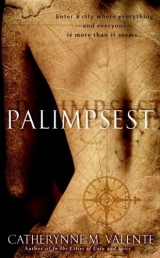
Текст книги "Palimpsest"
Автор книги: Catherynne M. Valente
Жанр:
Классическое фэнтези
сообщить о нарушении
Текущая страница: 13 (всего у книги 19 страниц)
THREE
NOW. NOW.
Hester came to visit Oleg, most days. She was always prettier when she had come in from the cold. The blood in her face was whipped up, her hair full of snowflakes that barely melted in the air of his apartment. She brought him a little bottle of orange juice, which he somehow remembered being sweeter than this, tasting more of sunshine, of mad and green places with Spanish names. It was acidy instead, thin. Hester could not keep food warm on the long walk to him: gray hamburgers arrived with gluey ketchup, street hot dogs with sauerkraut frozen at the edges. Oleg wolfed it down, every afternoon. He did not care.
One day, Hester arrived to find him shivering, an empty paint bucket in his hands. Oleg had filled it in the industrial sink down by the boiler and lugged it up five flights to dump it onto his bed with a dull splash. He stared at it until it started to freeze—he had stopped paying the heat a week before. But shehadn’t come, not her, not Lyudmila, the one he wanted, not his sister in her squeezing, tiny red dress who would hold him until all his memories which were not of her fled, and she was the only thing left in him.
But only Hester came. “Well, fuck,” she had said succinctly, and he had curled up on the floor.
But Hester had recognized it all, all of him, all of his acts. She knew him, somehow. She sat up with him and talked about the night she had woken up in the graveyard and all those gray fingers had reached out of the bamboo to her, and all she could smell was death. He didn’t understand why this could upset her so, but he listened. He was good at hearing, at receiving. She had known that there must be others, but had not sought them out. Could not bear the smell. Once in a while one of them found her, and she hated them for it, for their eagerness, for the beauty of the city they told her about, when she knew it was not so, that it was a cold, grim thing crawling with worms, still reaching out for her. Hester could never see the burnished, gleaming thing they saw, and she reviled them.
“What did you see after me?” he asked her.
Hester quavered, and a tear fell past her chin to the sodden floor. “I couldn’t,” she hissed. “I took my pills. I took eightof them. I needed to be sure I wouldn’t dream. I took enough that it couldn’t get through, it couldn’t touch me. It stayed in its tree.”
_______
That sort of thing happened when he spoke to her. He often did not. She left the juice and food near his prostrate body and locked the door behind her. He had made her a key on a particularly good day when the sun was out and she had brought bisque from a far-off, surely mythical, deli. He had felt warmly toward the little brass thing. It was hot in her hand. But the days were not always so kind. He stared at his bed for a good and honest shift of nine hours, and willed Mila to appear there. In a moment, she will come,he thought. Now. Now.But she was not, and would not.
He slept as often as he could, until his body was so weary of sleep it tasted like ash settling over him when he could manage it at all. He wanted Hester’s pills, but they would take his dreams, and that he would not allow. He hadn’t taken his own pills in weeks. It didn’t help—Lyudmila would not shiver into being on the footboard of his bed.
Oleg called her sleeping and waking, letting that horrid little boat float up and down the river of cream, calling her name. She did not appear there, either. He had lost her utterly, a more profound loss than the day she drowned. The girls with their braided nets stopped their fishing to stare at him as he screamed for her, screamed until his voice was gone and he could only whisper her name to the stars.
His hipbones had begun to bother him—he could not sleep on his stomach any longer, as they lay against the floor like sharp prongs holding him up. Oleg didn’t think about it much, just rolled to his back and murmured her name again, like a koan. His shoulder blades protruded like wings, and that hurt too, but not as badly. Hester brought ointment for his sores and he did not know why, did not know why it would matter to her.
“It hurts you,” she had said, finally, her face a mask of distress. “The city. It hurts you like it hurts me. It’s notjust me. It’s not kind to everyone else and cruel to me. It’s cruel to you, too. On the outside, and to me on the inside.”
“I just want Mila to be there when I go back. For her to be somewhere, anywhere. I did a bad thing to her. I scared her, the way the graveyard scared you. And now she won’t come back. But I want to, I want to . . .”
Hester had cried with him and eaten the rest of his lunch. She did not come back for two days, and he mildly wondered what might happen if she left him, if she decided that he was not kin to her after all. He supposed he would starve. Mila would come then, wouldn’t she? She’d have to, to get him. To pack his bags for the country of death.
But Hester returned, wearing two scarves against the cold, and set a great, swollen address book beside him on the graying floor. Business cards stuck out of it like porcupine quills. It bristled.
“I told you they always tried to find me,” she said. “It used to happen so often. Nightclubs and bus stops and grocery stores, they’d just come up to me and grab me, like they had the right. I spat at them, especially when they sat there, all fat and in love, and tried to tell me all the wonderful things they’d seen. But I keep everything, really, everything.”
There were numbers, so many, and addresses. Organized, if not neatly. He looked up at her, imploring. How could he choose?
“Fine, fine,” she snapped. “Boy or girl?”
He laughed hollowly. “I’m not . . . in fighting shape. I think it’ll have to be a boy.”
Hester wrinkled her nose, though he could not tell if her distaste was for his choice or that he meant to do this at all. But there was a boy, by dinnertime—hardly a boy, a bookish-looking man with a thin beard that ran around his jawline and a long coat with its collar turned up. He kissed Hester and she let him, but when his hand strayed to her breast she bit him, hard, and shoved him toward Oleg in the sodden bedroom. He tripped a little on the doorframe. Hester stood in the doorway, shaking, rubbing her fingertips and keeping her mouth so tightly closed a soul could not have slipped through the space.
The bookish man did not seem to mind Oleg’s thinness, or that he was too weak with hunger and too much sleep to do much of anything but let himself be kissed, his legs plied open. But the man had a gentleness in his mouth, held there like a sliver of candy, a sliver of sweetness. He looked with understanding and pity on Oleg, and held him so very close.
“I know,” he whispered in his ear, “I know.”
And there had been some heat, some pain, some desire in his dull, depleted body when Oleg felt himself suddenly full of the bookish man, suddenly weeping with need for this, for this living thing within him, for the leaping, bright, and blood-rich life that was abruptly in him where only sleep and Mila had been before. The man held his sharp hips firmly and tenderly, so as not to bruise him, and came quickly as though he knew Oleg could not take very much of this. He called a name as he did, and Oleg wished him well of that stranger, wherever they were, wherever he could find them.
Hester watched, and wept, and clutched her book to her chest.
Seriatim and Deshabille
ONE MUST CRAWL TO ENTER A TEAHOUSE. Those who do not know this are too prideful ever to approach. There is a door in the side, big enough for shoulders, for a head bent in humility. The roof is thatched from the fingernails of hermits who send small black boxes full of translucent clippings every winter. They are never yellow, or else the true connoisseur would know that the tea brewed there is inferior, brewed by those of dubious skill and biography.
Darkness confronts you when you enter; there is so little light to be found when you are on your knees. The dim shadows clear as your feeble eyes adjust, and you see the golden walls, like skin, like the inside of a saint’s body. There are pillows for your penitent knees. A painting on the wall shows, in the quick, sure brushstrokes of a certain school of art, a city whose buildings are nearly as tall and spired as those of Palimpsest. But it is not Palimpsest, and you know it. It is just a landscape, like a mountain, or a flower; it was the great fashion some years past to sketch cities of the mind, places remembered or hoped for, with the same reverence given to a peony or a plover.
A man and a woman move through a ceremony which will be inexplicable to you, ignorant and foreign as you are. Rosalie will draw her tongs of mother-of-pearl from her dress and pull new cups from a kiln of great beauty and delicate construction, whose gaping red mouth is the only light in the teahouse. Scamander will draw his tongs of black pearl from an ice bath, and pluck a disc of frozen tea from an icebox of great beauty and delicate construction whose gaping blue mouth is all you are able to see. There are tea leaves suspended in the greenish ice. He places the disc within the glowing cup, and the cup is cooled by it as the tea is heated, and the steam which unfolds is as rare and sweet as a ghost of sugarcane long perished. They will hold your head as you drink, exactly as parents teaching their child to drink will do. And when you have had your fill, they will smash the cups against the wall and wail in grief for their passing, and you will be brought low by their pure and piercing cries.
I taught them how to do this, when all of us were young. I do hope you enjoy our little local customs.
Scamander and Rosalie have spent their lives in service of this ritual, and they believe wholly in the symmetrical thinness of the edge of a teacup on the potter’s wheel and the edge of the tea as it freezes. These things are full of meaning for them, and they wrote a monograph on the subject when they were in the fullness of their faith. Their teahouse is situated in a small park between Seriatim Boulevard and Deshabille Street, a trapezoidal space with seven white stones in a pleasing arrangement under a larch tree, which was confused in its profligate youth and now drops chestnuts each spring. In order to reach it, one must dodge the traffic rails, which are well-greased and smooth here, and leap into the park before one is crushed by a carriage, motorized or muscle-drawn.
This, too, is pregnant with significance in the eyes of Rosalie and her husband, for grace may only be found briefly, and always in the midst of madness.
_______
Ludovico does not know he is meant to crawl, but it has become his natural locomotion, like a rabbit jumping. It is dark inside, as it should be, and he lifts his eyes to the crowded house only to see what he has so long wished to: a blond woman with a green scarf sitting calmly cross-legged as a deva. She holds the naked hand of another woman in hers, a woman with mad black hair and a stare like a lion flicking its tail.
_______
I have saved this for him. For us to watch, and for him to suffer. But I could not hold her back from him any longer. Perhaps I am overeager. I know you will forgive me.
_______
It is Lucia, of course it is Lucia, why should it not be Lucia? Why should this not be granted to him, this chance and this grace? If he would but ask Scamander about the coincidence of it, the old man would explain about discs of ice, and how they thin as the edge approaches. The place where air meets ice is fraught with possibility, and it is not for mortal men to inhabit.
Ludovico whispers to his wife.
“Lucia. Oh, Lucia. You’re here. You’re here.”
Her eyes constrict. She stiffens as if to run, but the ceiling is too low and it would be an impoliteness beyond bearing.
The blond woman beside her, who can only be Paola, coughs apologetically and Lucia nods to him exactly as a stranger just introduced might: meaningless kisses on the cheeks, a cold countenance, but she is shaking. As her lips graze the still-hot rim of her cup, her chimera mouth pleads without sound:
Please go. Let me have this.
But Ludo does not know the protocols. He is too full of tears and hope for that. He cries out, loudly, and the room freezes, the drinkers sneer, their lips curling back from sharp teeth. “Lucia,” he brays, “where have you been? What do you mean?”
Her eyes are liquid, enormous, a child caught out. “This is mine,” she whispers, mortified by him, his appearance, his disrespect. It will reflect poorly on her. “You can’t have it. Please.”
Ludo is beyond comprehension. He crawls to her on his knees, in humility, in shame, penitent. Begging to enter again his severe and monstrous idol.
“I didn’t want you here,” she hisses.
Paola snorts a little. She is too familiar with Lucia, behaving as if she is in full possession of the situation, and how dare she presume to know a thing about them? Ludo hates her immediately, sorts her past eel and mouse and into insect, devouring, soulless ant.
“He couldn’t have gotten here in the first place if not for you, my love,” she says gently, “so don’t be too angry. If you didn’t want him here you should have shut up your bedroom like a mosque. I did. I thought you would.”
Lucia rolls her eyes. “I was sure he wouldn’t figure it out—no one does from the first night, and what were the chances he’d find another one of us? He never leaves that apartment.”
“Figure what out?” Ludo is conscious of a great many eyes on him, but he cannot make himself move from his wife. She looks at him pityingly.
“This place, Ludo. Palimpsest. This city. How to get here, how to live here.”
At that, the patrons scramble to the tiny exit, a sudden riot of velvet hats and gold-soled shoes, shoving and squeezing through the little door, crawling desperately over each other to get out. They do not like it, they do not want to hear it, to know it.
“Lucia,” he says when the room has cleared. For him it is so simple. “Come home, please, I have missed you so much.”
She puts her hand on his head, an old gesture, not yet leeched of tenderness. Her hand and her voice are cold. “But it couldn’t have been only me. He’s here now, and this is very far from where I would have taken him. Who was it, Ludo? Who let you crawl into her like you come crawling to me now? Did you even know that’s how it works?” She stares spitefully at him, her hair piled up and strung through with tiny bronze feathers.
“Nerezza. And Anoud, later. It didn’t meananything. It was a way to you. She said it was. The only way.”
Lucia hoots haughty laughter. “That’s impressive. Nerezza’s like a sphinx. Awfully hard to pry open. Is that what you liked about her?”
“It wasn’t about liking.”
“But you do, I can tell. I was married to you. Was it eight years? I stopped counting.”
“What difference does it make? You left me. You could not have run further away from me. How can you be jealous?”
She looks at him blankly. “Do as you like,” she spits.
“I’d likeyou to come with me. Give me your hand, come home. It can be easy. I won’t reproach you, not ever. I swear it. It will be as it always was. You will lie on the couch the color of pecan shells and I will kiss your shoulder blades. It will all be forgotten.”
Paola puts a firm hand on his shoulder. “Save it. It’s over.”
“Who the hell do you think you are?” he shouts furiously. Scamander flinches in the corner of the teahouse and Rosalie clutches her tongs in the event of hysteria. “Who the hell are you to talk to us? You have no right.” He strikes the floor with his palm, and it is wrong, a tantrum, a childish thing, but he cannot help it.
“I’m hers,” she says simply. Her eyes slide into him, appraising, searching, and withdraw, finding him lacking, surely, small, an animal. “She lives with me in the real world. In a little flat overlooking a river. We have geraniums and a cat. We belong to each other, and soon we’ll find the last one of our Quarto, and then we’ll be able to live here forever. And you will only ever visit.”
“I met someone, Ludo, a long time ago.” Lucia sighs. She is trying to be kind and he recognizes that this is a trial for her. She can barely contain her scorn. She holds it before her like a shield. “A man with a funny birthmark. You know it by now. You have it. I’m sorry for that. Fucking him seemed harmless, an act performed outside our walls, and therefore unreal. You taught me that, that nothing outside us could be real. I believed it, I think. I believed it in Ostia. I believed it until him. And it washarmless, it was. You were so busy with that book, that Japanese thing. You didn’t need me. And to have a thing I didn’t have to share with you was rich and sweet. I was spread out under you so far and so thin, nothing of me was my own.” Lucia looks at her empty cup. “It is so beautiful and awful here, so much more real . . . well, more real than you. Than the story you told about us. This is my place, now, it’s not yours, it’s not. You have the world, this is mine.” Her voice had grown high and panicked, as if he were preparing to steal something from her. “You have Isidore and your glue and you have your brothers in Umbria and I had nothing, nothing but you and those stupid walls, and I was lonelyliving inside you, Ludo. You are not big enough for me.”
“I . . . I thought we contained each other. I thought you were happy, as happy as you could be.”
“No, Ludo, youwere happy. Now listen to me, please.” She leaned close to him, her breast brushed his arm. “Get out.”
“No! I won’t leave you. I can do as well as you, I can crawl through Rome on my belly like a worm and find all the secret ways in.”
“You can’t follow me. I’m inhuman, remember, a monster, a chimera.” She spat their private word between them and he recoiled from the lump of it. “You are just a man, you cannot go where monsters go.”
“I’ll find my Quarto first. I’ll beat you to it. I’ll take this place from you.”
Lucia laughs, loudly and cruelly, a braying, mocking laugh he had only rarely heard. The blond woman all in green draws to her feet, pulling his wife with her.
“Ludo, you’re a fool,” Lucia hisses at him. “You might as well be wearing a hat with bells and drool on yourself for the amusement of your betters. You’ll never manage it. They fought a warover this, Ludo. People died, for real, in the real world and here. They bled and they had their hearts eaten by . . . by people like me. Death, real death, not some dancing skeleton on vellum. The price of it, the price of the tea I drink, the races I watch, the slices of chestnut I will eat, the wines I will drink, the price of all that would break you in two. It nearly broke me. No. Rot in the real world, Ludo. That’s where saints live, under the sun, under the open sky. Their holiness means something there. I don’t want you here.”
Ludo reaches out for her, grabbing at her feet, pathetic, knowing he is pathetic, unable to stop himself. “I love you, I love you, stop it, please. Just come with me. It doesn’t have to be home. I will stay here with you, and we’ll be a world within each other again.” He is wretched, yes, and he knows it. He is crying, and kisses her knees. She rolls her eyes.
“Give me back eight years of huddling for warmth in a cave of your making. Give me the dress I wore in Ostia, and my cigarette case with the cockatrice on it. Give me everything in me that was stamped out by everything in you. Give me back a girl who had never heard of a chimera, who had never read that stupid encyclopedia, who had never had to hear herself called an animal. Then I’ll come home.”
Paola strokes Lucia’s cheek with the back of her hand and pulls her like a doll, extricating her from Ludovico. He does not trip her, but he wants to; he knows her ankles and they are his, forever, always. But she crawls past him, weeping so bitterly that her back arches and heaves with it, as though she is trying to expel something from deep within her. They disappear out the tiny door, and Ludo lies slack-mouthed on the floor, his heart livid and black, his throat cracked like an old book.
_______
Rosalie pulls an incandescent cup from her kiln, and Scamander pats her hand warmly, the dirt and blisters of decades in the fingers he puts on hers, the witness of themselves in Lucia, in Ludo, in all the times when the children were a trial and the money was scarce, when tea and cups were too thin, far too thin, to separate them from the empty, sterile air. Rosalie cradles Ludo in her lap, and Scamander steams the tea. He holds it to the poor man’s chapped mouth, and the bookbinder drinks mechanically.
“It’s all in how you swirl the tea in the cup, son,” he says gently. “Clockwise, four times, not a bit less. That’s the secret.”
_______
Ludo crawls again from the teahouse. The grass is cold and wet. The tips of the blades are beginning to freeze, stiff as quills crackling under his clumsy palms. He stands up beneath the baffled larch, and traffic sings by, little different than Roman traffic, carriages and motorcars more ornate, more frilled and flared, but a bustle and shout he knows, that comforts him. In no city can he imagine the traffic as anything other than this exercise in martial prowess and disdain of death.
Ludo looks down to see that a bee has alighted on his hand. It perches on one of his protruding veins, that ropy road traveling up his arms and out of sight. He always wore his blood too bright, too close to the surface. Blood was the trouble. All that worry about the Phlegmatic tissues and it was always the dark, red, splattering blood that would be his plague.
The bee does not leave him, but instead rubs its legs together impatiently, as though irritated to find no pollen on this sanguineous flower. A second joins it, and a third. Ludo thinks he ought to panic, but, after all, Isidore had his bees, in every icon, in every fresco. If he could bear them, Ludo can—but of course, Isidore’s bees were representative, metaphorical, the spiritual manifestation of his remarkable intellect. These are quite real, and they seem to be whispering to each other.
There are five now. They ignore the larch and flutter their wings with indefinable emotion. Ludo turns his palm over and they eagerly gather in the little valley of flesh near the pad of his thumb. Their fellows are coming thick and fast now, a black veil with flashes of gold like lightning glittering within. Their buzzing is a long shriek, and he knows it, he knows the sound, for she knew it, that other woman, with a bee sting on her cheek, and he knows her, for he has tasted with her and danced with her, far from each other. Ludovico closes his eyes, letting them settle onto him, praying to his saint, his patron, his last guardian ghost.
“Let them bite me, Isidore,” Ludo whispers. A prayer. A plea. “Your small and industrious lovers of virtue. Let them taste me, who has no virtue, and carry me away to become honey in the mouth of a king with a diadem I shall never wish to see.”
FOUR
ACTS OF VESTA
Ludovico had told himself a thousand times over the years that it was stupid to come to the Forum to think. Tourists indulge themselves because they think it makes their thoughts more magnificent, eternal. A man who had lived here all his life should have been beyond such childish acts. Ludo approached forty years of age with an utterly accurate internal map of Rome laid out over his heart, so that his ventricles corresponded precisely to a history of epochal lust and clam-dye and death by poisoning. He should have been above a place so well trampled by the tiresome and well-meaning that it could possess no molecule of its original self, only the cells of their bored and time-strapped bodies, squinting in centuries of suns.
But he liked it there. He couldn’t help it. Ruins were calming to the scholarly soul. He liked to think about the Vestals in their great round house, which always looked to him like a salt mill, tending their little fires and writing diaries forever lost, diaries of quiet lives spooled out into virginity and the contemplation of a goddess of whom no stories were told at all.
Ludovico liked to think that, in the long years of their seclusion, the sisters wrote amongst themselves a secret Encyclopedia of the Acts of Vesta, stories of the hearth in which Vesta was a great and beautiful thing, her long hair dropping embers wherever she walked, striving in knightly fashion—of course she would have a furnace-grate for her shield, and a curling black poker as her lance—against demons of the everyday, against unfaithful wives and the winds of winter, against cruel merchants out to cheat her and against those many-headed ogres who seek the death of children: sleeping sickness, starvation, military service. Against the death of love.
Ludo liked to contemplate how their virginity was meant to keep the city whole, and as he sat in the shade of Byronic cypresses, he suspected it wholly true: that the inviolability of one soul can keep the whole of hell outside the gates of the city she chooses as her own.
Ludo thought, that day as they sat together on a low rise of crumbled stones far from the center of things, that Nerezza should have been a Vestal. In her utter impenetrability, she could have held the whole of Rome within her, red brick and tufaand aqueducts and catacombs, within the borders of her womb, and they would have been safe within her, safe forever, for no Goth or Gaul could broach that barrier.
“They didn’t sting me, at all, not even once.” Ludo sighed.
“I’m not surprised. Insect life is a funny thing there.” Nerezza squinted herself in the broad, brazen sun, the molten light which poured like splashing wine over every shattered plinth and capital.
Ludo cleared his throat a little. “The Etymologiaesays that bees are virtuous because they are much loved by all, and sought after with great longing by everyone, because their honey tastes as sweet in the mouths of paupers as in the mouths of kings. Do you think that’s logical? That a creature can be virtuous just because it is loved and sought after, that the act of being loved, of being sought after, even if it is passive, is equal to an act of martyrdom or great piety, which is active? That it can confer grace to a whole species?”
“I think any encyclopedia is bound to have a great number of lies and fancied-up stories in it, Ludo.”
Ludo shut his eyes against the light; he saw the pinkness of his eyelids swim before him. “But what does it mean, then, if a man is sought out by those virtuous bees? Sought out with great longing by creatures whose very souls are defined by the fact that they are greatly longed for?”
“I don’t know.”
“I wanted them to sting me. It was like the church, with all the silent people and their awful limbs, animal limbs. I wanted to be covered by other souls until mine was pressed to death, like a witch. Why do I feel that so much, when I’m there? Why do I want to be drowned in other people? I never want that here.”
“It’s different, for everyone. I can’t answer any of these things, Ludo. I’m glad you saw Lucia, that it . . . gave her up to you. Because you can’t really think that by chance you stumbled onto her Sunday tea. But I have no grace, nothing to add to any encyclopedia of that place, I am not sought after and I have no virtue.”
He wanted to say: I seek you. He wanted to say: You are not my wife, but you are my Virgil, leading me through circle after circle of Purgatory. How can a man not love the body that brings him so close to God? But in the face of her inviolable mood, her frowns and her stares, he could not make himself drag her into Dante.
“Oh, Ludo,” she whispered, “if you want to be happy, just let it be.”
“Before the teahouse, I would have clawed through the earth for fifty years to find Lucia on the other side, an old woman, bald and tired, leaning on a cane. Maybe she’ll still be there, with arthritis and absolution. But even if I never see her again, I have to go, I have to keep going to Palimpsest. I have to try. It is a world without an Etymologiae. Without an etymology, without origin. I’ll go, and I’ll lay a map of that place over my heart instead of Rome. I’ll rent a small shop, an accountant’s office, and write columns upon columns, everything that people know in that city. I will write, do you understand? I’ll bind books, too, I’ll bind them, as I have always done, and there will be pages like raw cream and the finest glues, the strangest glues, made from every kind of rendered beast, but I will bind only what Ihave written. Perhaps in fifty years, an old woman, bald and tired, leaning on a cane, will pass my shop and ask herself what strange old man is looking for his glasses in the display window, and we shall have a great deal to talk about. We will have coffees. I will save a chair for her. I am capable of that. Of waiting, of faithfulness. I am capable of service, of holding a city in my inviolable belly.”
Nerezza watched him with murky eyes, shaded by pity and loathing and envy. Ludo did not understand it, but the nature of eel-kind is beyond the comprehension of land-dwellers, and he let her invisible body, black as rope, circle him, circle him, crackling, sere.
“How can you talk about it as if you’ve already managed everything, merrily planning your little life in Palimpsest? Such a selfish little boy you are, Ludovico! You’ve borrowed a toy, and you think it’s yours forever. If Lucia had shoved you off her that night you would never have known about any of this.” Hard, friable tears moved in her eyes. “Do you understand anything? Radoslav is dead. If we have it right, if what Agostino told you is true, if we’ve guessed the way, I can never go. Not ever. And I won’t watch you gaily traipse into my country because your wife thought it was easier to just lie there and let you fuck her.”
Ludovico chewed his lip. Mine, mine and not yours.For as often as he heard it, there might as well have been a sign reading thus hanging over the city.








